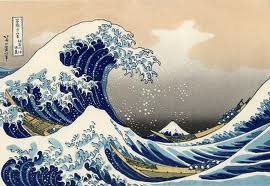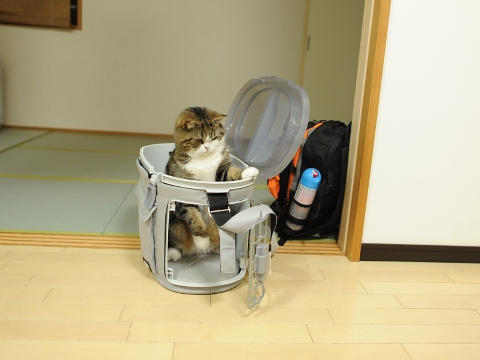 |
| The Great Wave Off Kanagawa by Katsushika Hokusai |
We still don't have the technology to predict when these disasters will occur, but technology allows us to reduce the cost of human lives. The fear, at present, is always that if it happens off-shore, that tsunamis will be created. While we can prepare for earthquakes, prevent the loss of life and damage through building earthquake-resistant buildings, we still don't have tsunami-resistant measures. Tsunamis are far more devastating, a series of waves, known as the "tsunami wave train", with a current warning time of only 10 to 20 minutes in regions close to the epicenter. There is simply too little time.
High magnitude earthquakes occur every 200 years or so, scientists stated that we were "overdue" in certain regions. Japan lies on the Pacific-Philippine-Eurasian triple plate junction and is therefore seismically very active. When it happened though, I could only think of putting up a quick post warning those living near the coastal regions of the pacific basin, who may read blogs before listening to the news.
Still, it is incomprehensible, horrific and I cannot begin to imagine how terrifying it was for those affected. In real life as in the blogosphere we live in a global community where friends and family are spread around the world. To date, all have checked in and are thankfully safe, but shaken up. To extend my deepest sympathies and condolences, while absolutely sincere, seems rehearsed, but words fail me. There is a feeling of shock and helplessness; at times like these, I desperately want to reward a sniffer dog.
Over the next few days, the media will continue to show us an onslaught of devastating images, eye-witness reports and cycle through "breaking" news. A sensationalized show of devastation and suffering, with incorrect facts and tag words presented by, at times, inappropriately over-enthusiastic reporters. I will not be watching.
I turned to the internet, where I can choose the news I want to see and hear. In a new age of being connected at an instant and global level, I found humanity at its best. Within minutes twitter topics had gone up, Google People Finder had stepped in, seismologists gave quick and informative updates. Amazed, I scrolled as people from virtually Every.Single.Country extended their sympathies and support, countless voices as one: "We are with you, Japan!" Geographical, economic and religious borders were irrelevant in this global display of support. For those in Japan, who lost mobile service or the internet, they were still able to communicate. Some of the most touching messages came from people in Christchurch, NZ, who are still dealing with the recovery from the devastation and damage they experienced. Proclamations of gratitude for Japan's aid and that now they would be there to help the Japanese.
It will take time to assess the damage and years to recover. Aftershocks will continue for months as the tectonic plates adjust, but I cannot help but be impressed by the advanced technology of Japan. So far, the death toll, while tragic has been mercifully low. The fact that Tokyo's buildings withstood an 8.9, minimizing the loss of human lives and injury, is a testimony to Japanese engineering and highly advanced earthquake preparedness and disaster proofing. Technology and engineering which is already testing new tsunami-resistant homes. Homes that may be build one day with a sacrificial first floor, that water can just flow through. When it comes to natural disasters there is no such thing as being over-prepared.
And then I heard an excited announcement: "MARU IS SAFE!"
Maru, Japan's most famous cat, has entertained many with his antics. A lovable, clumsy dork of a cat, who has devoted his life to fitting into boxes. Safe. A comfort amidst all the tragedy.

Good post. That there has not been more loss of life is really a credit to excellent engineering and foresight.
ReplyDeleteIt is also gratifying that Maru is ok
Thank you. We forget that Japan is more prepared than any other country, we can only hope to follow their lead.
ReplyDeleteIncluding the strict and enforced! building codes.
Maru; I'll take any good news I can get.
Do you really think we will have another Pangaea? I thought the continents were drifting apart, and becomming smaller.
ReplyDeleteJapan is near or on Four of these tectonic plates. They sit right on top of the Pacific and Eurasian Plates. No wonder the country is the leader in Earthquake technology.
Now all we need is for the Yellowstone Caldera to blow. End of the world as we know it.
OH! I'm glad Maru is OK.
ReplyDeleteSprite, according to current estimates, yes. Continental drift is cyclical. In about 100-200 million years, give or take. Geologists already named it "Pangaea Proxima" and from the sounds of it, glad I will not be around to experience it.
ReplyDeleteInland will be an uninhabitable Superdesert...
Yeah, I agree, but I really think that other countries need to prepare. There are many more fault lines. No blowing of anything else. Don't need it.
Maru. Love the little goofy guy.:)
The one running down the east coast of South America is a biggie.
ReplyDeleteBTW I've always loved that painting.
ReplyDeleteSprite, same here. They were such masters.
ReplyDeleteFriday, as I was packing up to leave the office, some Members were discussing the need for infrastructure, warning systems, and the like on the House floor in light of the Japanese earthquake and tsunami. Unfortunately, politics plays as much of, if not a larger, role as science in how we would cope with such a disaster.
ReplyDeleteI think that everyone should visit Yellowstone and see the exhibits on the caldera. One exhibit showed the "path" of the caldera over the past 15 million years or so, a reminder of how the plates continue to move.
Gaelic Wife, unfortunately politics can be found within science too. Funding and being suffocated in the inefficiency of red tape to name a few.
ReplyDeleteA friend and I were discussing that this may serve as the global wake up call. Some countries are already starting that conversation, hopefully with tangible results. Economics. Imagine, the cost of retrofitting!
I agree about Yellowstone. Visits should be mandatory for so-called "decision makers" ;)
At least, if the scientific crystal ball is to be believed, there is no threat that it will turn into a Supervolcano anytime soon. One can only hope...
truly terrifying. disasters like that seem so surreal to me. living on the prairies, there are really no massive dangers like that to threaten us. i can't imagine facing such devastation.
ReplyDeleteFantastic post! It's really quite humbling how insignificant we are when the Earth decides to jump ugly with us. A "For What It's Worth" observation: as I was looking at my stats (as is my wont), I noticed that someone from Japan was visiting. Wow, in the face of such an epic disaster, someone was having a look at an old guy on a curbside toilet. A truly impressive people!
ReplyDeleteManders, surreal is right. Incredulity; I saw a house and a bus on top of a building.
ReplyDeleteAl, thank you. Yeah, I know what you mean, insignificant is the right word. The earth has been doing this for billions of years. Life finds ways to survive.
ReplyDeleteTokyo still has power and if our little insignificant ;) blogs offer them even a modicum of escape, a little amusement...Other than donate what else can we do?
As for what to do, my best guess - not being search-and-rescue trained - is be still in the awareness of how deeply connected we all are. If we are able to share strength and hope by such focus...as I said, my best guess.
ReplyDeleteYes, this response to the crisis in Japan reminds us that almost nobody on earth should suffer for want of assistance. We no longer have the excuse of ignorance.
ReplyDeleteANNNT!! (whining) Deebs thinks I'm calling him names!!
ReplyDeleteMarylinn, it's a perceptive guess. I've never liked standing by and watching, but these days the watching leads to action. Heard how much they appreciate the support and sympathies.
ReplyDeleteTatty, the age of ignorance? Noticed the "almost" ;)
ReplyDeleteSprite, hold on. I'm checking something.
ReplyDeleteI will not be watching either. It makes me feel like a voyeur, and at the expense of the extraordinary suffering of others.
ReplyDeleteIt is though, as you said, in disasters that we can find humanity at its best. We reach out any we can.
mail.
ReplyDeleteAnd it's only through hubris (I love owning a dictionary) which makes us think the universe absolutely needs us to carry on.
ReplyDeleteJayne, hello. Completely agree. I just wish that they would allow experts to comment and explain, rather than "correspondents", who do not have the background to relay information accurately.
ReplyDeleteI'll be by to visit.
Al, you mean we're not the center of the universe??!!
ReplyDeleteMy only knowledge of tectonic plates stems from year ten science class. It is definitely amazing to see the outpouring of support on the blogs and even on social networking sites for Japan.
ReplyDeleteI enjoyed reading your post.
Hi Ruth, thank you. Most people who did not pursue science are in the same boat, knowledge vaguely remembered from science classes.
ReplyDeleteOH Ruth is here! She is so nice :) a fellow Aussie to!
ReplyDeleteMail :{
I fear the double-tragedy of some type of similar level of natural destruction in this country - here, were everyone is expected to be responsible for themselves, I would expect people focused on their self-interests, running around with assault rifles, looting, hording and a general breakdown in civil society.
ReplyDeleteRobert, frightening, but realistic description of what would happen. Our "civilization" is superficial in times of crisis. Some of the stories that are coming out of Japan are truly incredible, they really seem more advanced in more than just technology.
ReplyDelete